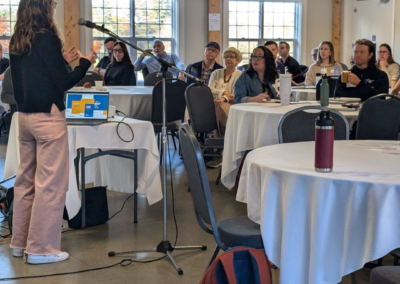Connecting Communities: Sustainable Transportation for Atlantic Regions
By Lara Weron, Junior Lead, Summer 2024, QUEST Canada
Transportation is the backbone of our daily lives, connecting people to their jobs, schools, and essential services. However, it’s also one of the largest contributors to greenhouse gas emissions, especially in Atlantic Canada, where many communities rely heavily on personal vehicles. As climate change accelerates and communities look for ways to reduce emissions, sustainable transportation has emerged as a critical component in reducing emissions and meeting net-zero goals.
Transportation is something all of us partake in regularly, which is why the way we choose to do it, or are able to do it, matters a great deal. Not only does it have a large potential impact on the health of our surrounding environment, communities, and local economies, but also on our mental and physical health.
Atlantic communities, both urban and rural, are taking their first steps toward cleaner, and more efficient transportation systems. While challenges remain, such as limited public transit options and the geographical spread of rural areas, solutions that work for both urban and rural settings are being explored.
Understanding the current landscape
In Atlantic Canada, automobiles dominate the transportation landscape, particularly in rural communities. Many areas lack public transit infrastructure, leaving residents dependent on personal vehicles for mobility. This reliance on cars leads to a range of issues, including traffic congestion, high transportation costs, and significant emissions.
Urban centers like Halifax and St. John’s have public transit systems, but they often lack the efficiency, accessibility, or capacity needed to serve the entire population effectively. As a result, even in cities, many people still rely on their cars. The question facing many communities today is: how can we create a transportation system that is not only sustainable, but also serves everyone?
Urban vs rural solutions
Urban and rural communities face different challenges and opportunities when it comes to sustainable transportation.
Urban communities
Urban centers such as Halifax, Fredericton, Moncton, Saint John, Charlottetown, and St. John’s can leverage their higher population densities to support frequent public transit services. Expanding bus routes and increasing service frequency helps people rely less on personal vehicles. For example, Halifax has already started introducing electric buses which will not only reduces emissions, but will also cut long-term operational costs.
Active transportation infrastructure such as investments in bike lanes, pedestrian pathways, and greenways is crucial for encouraging active transportation options like walking and cycling. Urban communities are also well-suited to adopt car-share and ride-share programs which can reduce the number of vehicles on the road. These programs, such as Communauto Atlantic service in Halifax, allow people a flexible, more affordable, and low-emission alternative to owning their own vehicle.

Urban centers also provide an ideal setting for electric vehicle infrastructure. Public charging stations and EV incentives and rebates can further support people who want to transition to electric cars and help reduce overall emissions in the cities.
Rural communities
Rural areas, such as small towns and dispersed coastal or inland communities face different challenges. Their population density is much lower and long distances between destinations can make public transit solutions difficult, but there are still effective ways to introduce sustainable mobility in these regions.
On-demand transit services may replace the traditional fixed-route bus systems to provide a flexible and important solution. Programs like the Community Transportation Network in Nova Scotia services several rural communities across the province. They provide options for residents who need transportation to get to and from medical appointments, school or classes, recreation opportunities, shopping, and visiting friends. Having this community-based transportation improves the quality of life for residents and allows people to remain in their homes without having to move to urban centers.
Similar to urban centers, carpooling and ride-sharing networks can still reduce vehicle use, while active transportation infrastructure can still be implemented to connect town centers for shorter trips. Electric vehicle adoption supported by charging stations and incentives can further reduce emissions.
Behavioural changes: the missing piece
For many, driving is a deeply ingrained habit. The thought of switching to a bus, bicycle, or walking may seem inconvenient or unappealing. That’s why practical experience and education are so important in promoting sustainable transport. Experience-based programs can help build confidence in new modes of transportation by creating positive personal experiences that make the change less daunting.
Experiential learning programs are highly effective in promoting sustainable transportation. Organizations like the Centre d'action écologique run initiatives such as Making Tracks, Welcoming Wheels, and the Bike Buddy program, which provide hands-on cycling education, while Next Ride offers electric vehicle test drives and information sessions. These programs give participants practical experience with sustainable transport options, helping them become more comfortable and confident in using alternatives. By directly engaging with these modes of transportation, individuals are more likely to make an effort to adopt them in their daily lives.
Expanding experiential programs across all Atlantic provinces is essential for promoting sustainable transportation. While Halifax has many initiatives, other Atlantic communities still lack access to similar programs. Introducing hands-on programs in these areas would empower residents to gain confidence in considering their sustainable options, helping them to adopt different habits.
The transition to sustainable transportation is key to meeting net-zero goals. Urban and rural communities alike have different challenges but also unique opportunities to lead in sustainable mobility. While policies and infrastructure investments are necessary, lasting change will come through behavioural shifts, where people gain confidence and faith in embracing new ways of moving around.
ABOUT THE AUTHOR

Lara Weron
Lara, Junior Lead at QUEST Canada in the summer of 2024, holds a B.Sc. in Environmental Science from Dalhousie University, and gained valuable experience working in both municipal and provincial levels of government. Her experience is centered on clean energy initiatives within the transportation sector, and how integrating improved active transportation planning can effectively contribute to reducing greenhouse gas emissions. She lives in Halifax, NS.

About Powered by Communities
Established in 2017, Powered by Communities is an awareness-raising, communications and media platform that highlights and celebrates local community energy initiatives taking place across the country, from coast to coast to coast. The platform inspires, informs and engages its readership with stories and articles detailing community energy initiatives being led by local governments, municipalities, Indigenous communities, community groups, non-profits, charities, and enterprising individuals.

À propos de QUEST Canada
QUEST Canada is a registered Canadian charity that supports communities in Canada on their pathway to net-zero. Since 2007, we’ve been facilitating connections, empowering community champions and advising decision-makers to implement energy use and emissions reduction solutions that best meet community needs and maximize local opportunities. We develop tools and resources, convene stakeholders and rights holders, and advise decision-makers — all with the goal of encouraging, assisting and enabling communities to contribute to Canada’s net-zero goals.

Support local communities by sharing this story
MORE FROM POWERED BY COMMUNITIES
S'inscrire
Rejoindre la conversation!
Inscrivez-vous pour recevoir les dernières nouvelles et mises à jour sur les événements de QUEST Canada et recevez la newsletter mensuelle de QUEST Canada.




